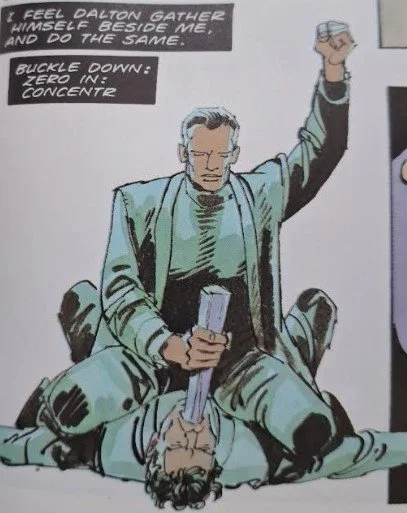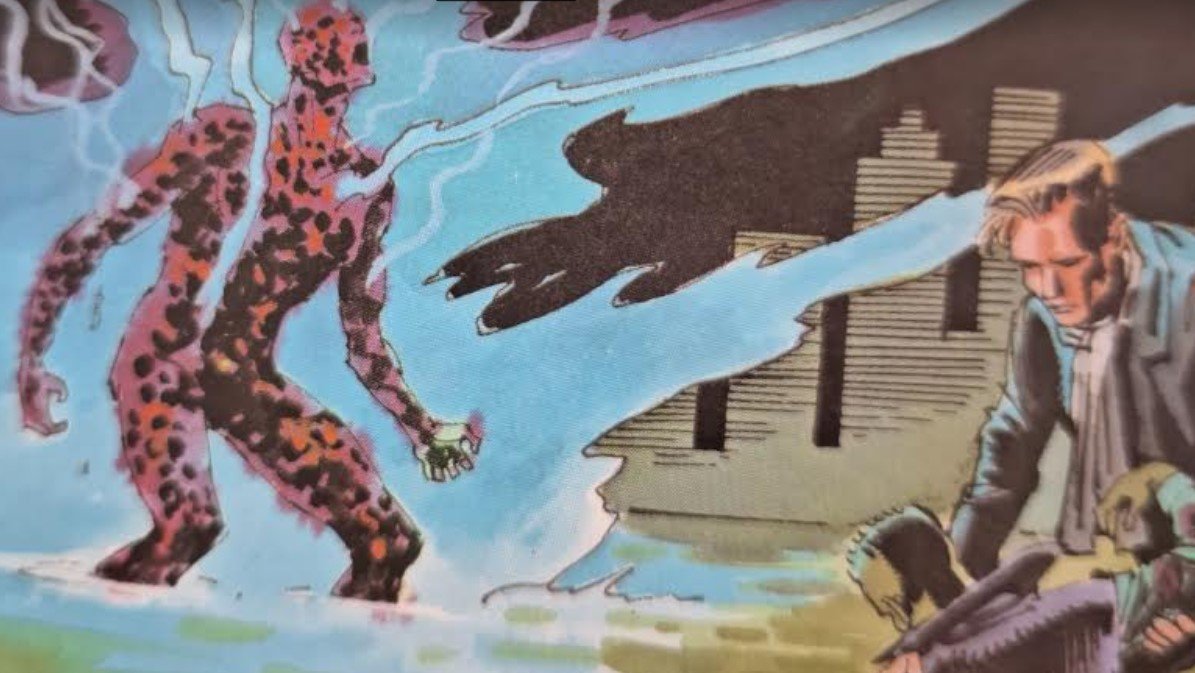New Statesmen: finale
"What was the point of this?"
I've asked this about many different segments, from many different works. And about a good number of works in their entireties. I don't think I've ever been made to ask it as emphatically as I am about the final chapters of New Statesmen.
Well. There are some good things in here. For instance, observe this kingfisher as it snatches a little minnow while Dalton and Vegas are talking in the midground:
Is that not a well-drawn kingfisher? It's very detailed, and it captures the motion of the animal really faithfully. On top of being very well illustrated, it is also a cute kingfisher. I hope it enjoys eating that minnow it caught. If it has chicks, I hope that they enjoy the minnow as well.
This is the high point of these last five issues. These are the only panels from them that have even a small chance of me remembering them a week from now.
In response to having some of his skullduggery exposed (or...maybe? I kind of feel like this was all in the process of happening anyway, considering how well Phoenix appeared to defend himself in the court of public opinion on TV), Phoenix starts rallying his followers for war. When the overly conciliatory governor of California gets assassinated during a miquetoast speech trying to get everyone on both sides to calm down (not clear if the shooter was a christofascist or a counter-demonstrator), Phoenix's followers launch a massive terror campaign throughout the United States and in California particularly. Cue multiple pages of gay people being shot and beaten to death in the streets, cars full of children tumbling into the water when the Golden Gate Bridge blows up, cute animals burning to death in a flaming zoo, you get the picture, etc.
And then, apparently, it's time for the boss fight with Phoenix.
While the riots and terrorism are going on, this other New Statesman named Burbank who I don't think has been all that relevant until now is sent to assassinate Phoenix. He fails.
Also, when Burbank finds Phoenix, he's meandering through the blood-filled streets of LA and petting a dog whose owner is laying around in pieces. And then, after Phoenix kills Burbank, he kills the dog too.
I lol'd. Hope the fish kid was around to see this, he'd have loved it.
After killing the dog, Phoenix moves on toward San Francisco to...um...apparently he wants revenge on the main characters who (maybe? I'm not 100% on the chain of cause and effect here) aired his laundry and triggered this breakdown. Again, not sure how or even if that is actually what happened, but that's how it seems at this point. He starts bullying Dalton and Vegas, interrupting their idle conversation about how much of a bitch Meridian is, while Meridian and Burgess are off poking around at the carnage from that hippy massacre.
Right. There was that convoy of hippies that ran into a United States military secret whatsit in the middle of the desert and all got murdered. Seemingly independently of anything else that had been happening in the story. Meridian and Burgess are still looking into that when Phoenix attacks the other two in San Fran.
And, um. Apparently Phoenix has been literally eating people's intestines on his way here. I thought it was just figurative at first, but rereading this page's dialogue I really, really don't think that it is.
Amazing. Truly phenomenal.
The running battle through the streets, sewers, and (for some reason) museums of San Fransisco is a decent one, as superhero fight scenes go. One gets the impression that Phoenix is definitely the most powerful of the omnimen, but also pretty overconfident in his power. He's more than a match for any one of the others, maybe even any two. He does make an effort to divide his targets and deal with them one by one, but he was still pretty rash to enter a situation where there was even a strong possibility of himself getting ganged up on. Vegas is the first of the four to be attacked, and manages to be defiant enough to keep Phoenix busy long enough for the others to catch up. Meridian plays battlefield control, using her psychic links to coordinate the group and keep Phoenix from isolating more of them, while Burgess and Dalton run interference. Pretty characterful in how they fight overall.
There's also a lot of just-plain-weirdness to this sequence. Not sure if it's good weird or bad weird, just weird. Like, there's one part where Phoenix manages to subdue Burgess in the museum whose wall they just broke through and starts doing...this:
Is this supposed to be him doing a homophobia? I think it is? Would certainly be in character, given that LGBT are his movement's number one punching bag. Still. Weird.
Weirder still is this soap opera-esque drama that happens right before this, when Meridian and Burgess manage to outmanoeuvre Phoenix and catch up to him when he's about to finish off Dalton. This is so eleventh hour I don't even...okay, so like, in the last couple of chapters there was this one or two page subplot about a love triangle between Dalton, Burgess, and Meridian. I didn't talk about it at the time because there was virtually nothing to say, and it was given very minimal attention or narrative importance. But, now Phoenix telepathically divines what's been going on between them, and uses it to try and tempt Burgess to the dark side.
There wasn't nearly enough setup for this to be a payoff to, though.
And also...Burgess has plenty of other, much more serious, personal demons that a telepathic villain could pick at in a dramatic final encounter. Every fourth sentence out of Burgess' mouth throughout the comic is about how he has PTSD. Why are we just leaving THAT angle of attack fallow while leaning into the tacked-on love triangle?
The weirdness, and also the out-of-nowhere focus on romance, then redoubles to bring this otherwise decent final boss setpiece to an utterly anticlimactic end. I don't think this was ever talked about before now, but apparently Meridian and Phoenix used to have a thing back when they were all killing brown people for Uncle Sam together. Maybe it was mentioned a little? Hinted at? Maybe? I'm straining my memory and leafing through the earlier chapters, and I'm not seeing it. Maybe this is a me problem. Well, anyway, with Meridia the last woman standing and the other three all dead or wounded, she finds that her residual emotional link with Phoenix lets her get under his psionic defences, and her other emotional link with the wounded Dalton lets her channel his pyrokinesis into Phoenix's brain.
Once again, I feel like this is satisfying payoff for setup that never happened. The comic could have been about Meridian's loves and how she deals with them now being at war, but it wasn't.
Anyway, Phoenix burns to a crisp like his namesake, and the fight is over. Very abrupt. Very anticlimactic.
Then...uh...there's a whole epilogue chapter about how the New Statesmen are all slowly dying from a genetic flaw in their creation, and how when they die all their psi-energy is being fused together to create an apocalyptic demonic entity called the Angelus.
And also the government has been working on another batch of optimen, even more powerful than this old dying crop. I thiiiiiink the implication is that the hippy convoy was murdered for stumbling their way into the creation lab? Maybe? I don't know why the feds would slaughter them all instead of attracting much less attention by turning them away at the fence of this "experimental radar facility" or whatever, but, well, you know.
We never find out what sequence of events led to the apocalyptic war from the intro. I guess remnants of Phoenix's organization probably played a role? And probably the new optimen batch? And probably that Angelus thing too? I think? Probably?
The end.
What was the point of this entire plot? Why was there even a story about fighting Phoenix if he was incidental to the more important stuff? Or, rather, why did we get an intro and outro about that more important stuff if the main body of the work was just a smaller-scale story about fighting Phoenix that isn't relevant to that?
Also, what was the point of the whole "statesmen" thing anyway? The optimen being assigned to the states was a centrepiece of the intro-exposition, but I don't think it was ever actually relevant to the story at any point. You know. The thing this comic is NAMED after. Why is it named that? Why is it a thing?
What was the point of literally anything in this entire comic?
My best guess, granting maximum charity to the creators, is that they intended for the Phoenix arc to just be New Statesmen's opening adventure. If this was meant to be a whole setting with a bunch of stories taking place within it, all ultimately culminating in the apocalyptic scenario with the world war and the Angelus and whatever, then I can understand the first story having a narrower scope. The outro would then be the creators trying to cram the rest of their ideas in at the end after realizing that no one wanted to read this comic and they'd never get to publish more of it.
If there was meant to be a lot more New Statesmen that the authors never got to put to page, then...well, I guess that's sad for them, but I also can't bring myself to say that it's any kind of loss to the world.
Aside from its occasional bits of prescience regarding American politics which I've praised throughout the volume, New Statesmen is a miserable product. A miserable product, and the herald of a miserable era for cape comics in general. This had to have been one of the first follow-the-leaders of Watchmen, and good god does it set the trend of mistaking that comic's style and its substance while ramping up the "subversiveness" (read: juvenile edge) beyond eleven. Everything wrong with 90's comics is foreshadowed to the point of blueprinting in New Statesmen.
The art isn't great either, barring a few exceptions.






